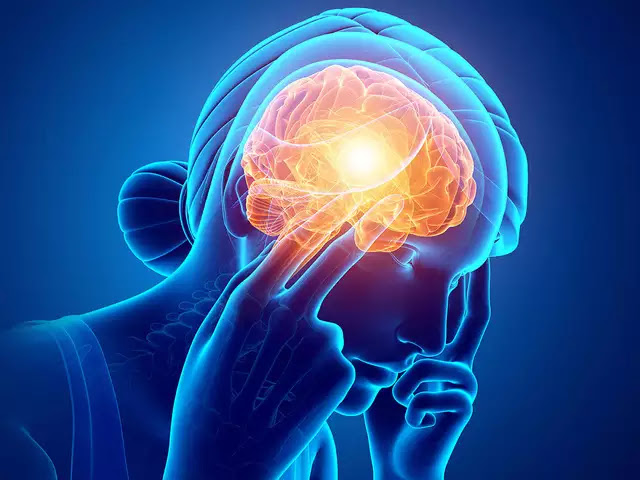Anxiety, sadness, and memory loss are just a few of the issues that stress may bring on in the brain. Stress hormones like cortisol and adrenaline are released by the body when a person is under stress, and they have an impact on the hippocampus.
Shrinkage of Hippocampus :
The hippocampus, a part of the brain crucial for memory and spatial orientation, can shrink as a result of stress, which can also alter other aspects of the brain's structure and function. Neurotransmitters, brain chemicals that affect mood, anxiety, and other mental health disorders, can shift in response to stress.Stress Effects in Childhood :
The physical, emotional, and cognitive development of a kid can be significantly impacted by stress during childhood. Chronic stress can impair a child's growing brain's ability to function normally and result in a variety of disorders, including anxiety, depression, and behavioural problems.
- Stress can affect a child's ability to pay attention, remember things, and learn. A child's immune system may also be impacted by stress, making them more prone to disease.
- It's critical to see the symptoms of stress in kids and offer them options and assistance so they can manage their stress.
Stress results on emotional behaviour :
The amygdala, a part of the brain involved in the processing of emotional information, for instance, might become more active as a result of prolonged stress.
- A person may become more readily provoked into a state of worry or anxiety as a result of this. Stress can also result in alterations in the concentrations of neurotransmitters like serotonin and dopamine, which can have an impact on mood and drive.
Stress and creativity power of Brain :
Stress can affect the brain's capacity to create new neural connections and produce new neurons, a process known as neurogenesis. This is an essential factor to take into account.
- This may impair the brain's capacity to learn from past mistakes and adjust to new circumstances, thereby impairing memory and decision-making.
- Stress can interfere with the brain's capacity to control wakefulness and sleep.
- Stress may result in sleep disorders including insomnia and other sleep disturbances, which can then cause a variety of issues like exhaustion, mood swings, and cognitive decline.
Does Stress Effect Immune system :
Yes ! stress may have an influence on the immune system, which can then have an effect on the brain. Stress can cause the immune system to respond by inflaming the brain, which can aid in the emergence of neurological and mental health diseases.
- The gut-brain axis, which connects the stomach and the brain, can also be impacted by stress. Stress can interfere with the regular operation of the network of hormones and nerve cells that connects the stomach and the brain.
- This may result in gastrointestinal issues including irritable bowel syndrome and other issues, which may then have an impact on mental health.
Stress and Cardiovascular problems :
Additionally, stress can affect the cardiovascular system, raising the risk of cardiovascular disease. Stress hormones, which can result in inflammation, high blood pressure, and the production of blood clots, enhance this risk.
- The effects of these cardiovascular hazards on the brain can raise the chance of stroke and other brain damage.
Stress cause long-term effects :
Stress can interfere with the brain's natural growth, altering its chemistry, structure, and function. Behavior, emotional health, and cognitive function may all be negatively impacted in the long run by this.
- For instance, stress in childhood raises the possibility of subsequent mental health issues including depression and anxiety.
- Stress results in long-term issues including greater sensitivity to stress, less stress tolerance, and a higher chance of developing neurological and mental health diseases.
Stress and Neuro-plasticity :
The brain's plasticity means its capacity to change with the environment and learn from experiences can be impacted by stress.
- Stress can thwart the normal process of plasticity, which can cause issues including trouble learning from new experiences, trouble adapting to new circumstances, and trouble acquiring new abilities.
Stress can also have an impact on neuroplasticity, the brain's capacity for self-healing and damage recovery .
- Stress can interfere with the neuroplasticity process, making it more difficult to create new neural connections, heal damaged brain tissue, and restore function after injury, among other issues.
Stress and Brain's ability to maintain social connections :
The ability of the brain to create and sustain social relationships, which are crucial for emotional well-being and general health, can also be impacted by stress.
- Stress can impair the social brain's regular operation, which can cause issues with building and sustaining relationships, recognizing and interpreting social cues, and making and keeping social bonds.
Ways to avoid Stress :
- Use relaxation methods like yoga, meditation, or deep breathing.
- Regular exercise will increase endorphin production and general wellbeing.
- Get enough rest and stick to a regular sleeping pattern.
- Set priorities and properly manage your time to prevent feeling overburdened.
- Take care of yourself by eating a balanced diet, abstaining from drugs and alcohol, and maintaining decent personal cleanliness.
- Socialize with people through online communities and take part in your favorite hobbies.
Instead of concentrating on the past or worrying about the future, engage in mindfulness practices and pay attention to the now.
If required, seek professional assistance, such as therapy or counseling.
Conclusions :
According to researchers and Neuro-doctors stress may have a variety of impacts on the brain, ranging from short-term alterations in memory and attention to long-term changes in brain structure and function that can result in the emergence of neurological illnesses and ailments affecting the mental health. Additionally, it may interfere with social relationships, neuroplasticity, and other natural processes, which may damage the brain's capacity for growth, repair, and adaptation.

Comments
Post a Comment